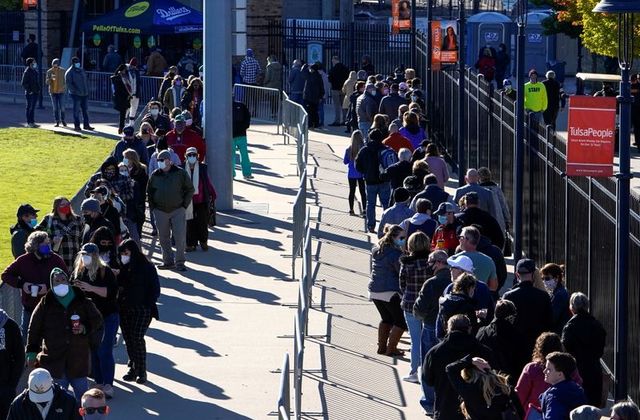https://arab.news/j9dg2

Voters wait in line to cast their ballots during early voting at ONEOK Field in Tulsa, Oklahoma, U.S., October 30, 2020. (Reuters)
Americans are often portrayed as wealthy and spoiled people who enjoy the benefits of democracy and all the freedoms that it brings, including free elections and the right to vote for the person they want to lead their country. Sounds like us Americans have got it made.
But do we? Is democracy really that satisfying? Consider these facts about the voting, the fundamental core of democracy, that took place in the US on Tuesday.
The truth is that for many Americans, elections are not really very satisfying experiences, and that usually means the biggest losers in an election are the voters themselves, no matter who they voted for.
For the past several months, Americans have been bombarded by negative campaign attack ads from both of the main parties, the Republicans and Democrats. The election contests that will be decided by Tuesday’s vote run the gamut from some of the lowest offices in the country to the highest in the land, as Republican President Donald Trump is challenged by his Democratic rival, former Vice President Joe Biden. Some people will also vote to appoint judges.
The email and social media accounts of Americans, when they are not being hacked, have been inundated with pleas from candidates for money, and bullying messages from some who warn that if we fail to support them, their rivals will win and destroy our homes and the economy, fuel violence, undermine our safety and deny our basic rights.
Our television screens have been taken over by campaign advertising filled with negative attack ads accusing candidates of being racists, misogynists, xenophobic and, in some cases, even guilty of crimes. There are so many ads that the commercial breaks during TV shows seem longer than the shows themselves.
I have seen former President Barack Obama appear on TV more during the past four weeks, in ads urging me to support Biden and Illinois Sen. Dick Durbin, than I remember him being on TV during his entire eight years as president.
The internet is being hacked by the Russians, the Chinese, the North Koreans and even the Iranians, and every email and social media post is a mental challenge to your sanity. It is making Americans paranoid.
On top of all of this constant lobbying — on the telephone, on television, on the internet and even at retail establishments such as grocery stores, where volunteers bombard you with flyers, handouts and pleas for support — we have the added burden of the coronavirus pandemic.
Even this plays into the paranoia of American conspiracy theorists, who are convinced that the coronavirus disease (COVID-19) was created by the Chinese in a secret military laboratory simply to mess with American lives, the economy and — most of all — our minds.
How can you not believe the Chinese did all of this on purpose to make our entitled, wealthy lives miserable, some say, because are not Americans the wealthiest, most spoiled people on the planet? According to researchers, the median American net worth is $52,700, and the median home value is $217,000.
So why are so many Americans complaining about the election? Well, this one has been more stressful than usual, it seems. According to a Harris poll, conducted for the American Psychological Association, more than 68 percent of respondents said that the 2020 election campaign has been a significant source of stress in their lives, compared with only 52 percent who said the same during the 2016 contest between Trump and Hillary Clinton.
How can Americans decide who deserves to win with all of these pressures and burdens being heaped on our shoulders?
And yet we rush to the ballots and vote, while many people are screaming in our faces — and will probably continue to scream even after election day has come and gone.
There is a lot of screaming, too. More than 134 million Americans voted in 2016, with 129 million of them split between Trump and Clinton. This year, analysts expect the number of people who vote to increase.
Because of the pandemic, many Americans wanted to avoid standing in long lines on election day and so more than 93 million of them took advantage of early and absentee voting, including mail-in ballots, which is an unusually high number.
There are a lot of Americans who do not care who wins the election and just want it over with so that they can move on and deal with whatever it brings.
Ray Hanania
That sounds like a lot, but more than 209 million Americans over the age of 18 are eligible to vote — as many as 70 million either register to vote but do not bother to do so, or do not register at all.
All of the ballots cast, whether in person, absentee or during early voting, need to be counted. It should be noted, however, that while some states count mail-in ballots in advance, others do not. Some also accept ballots that are mailed by election day but arrive later. All of this will delay some state results and could delay the final result of the presidential race.
By now, I bet there are a lot of Americans who, like me, do not care who wins the election and just want it over with so that they can move on and deal with whatever it brings. Higher taxes? Poorer healthcare? A worsening economy? Deterioration of the environment? Rising crime, protests and violence?
Does anyone really think that the election will change anything?
- Ray Hanania is an award-winning former Chicago City Hall political reporter and columnist. He can be reached on his personal website at www.Hanania.com. Twitter: @RayHanania

